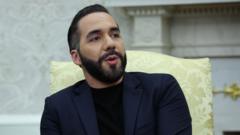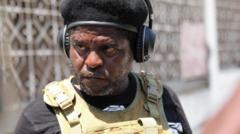El Salvador's President Nayib Bukele announced that Kilmar Ábrego García, mistakenly deported to El Salvador, will remain in his home country's infamous mega-prison despite a US Supreme Court ruling advocating for his return.
El Salvador Stands Firm: Deported Man Not Returning from US Error

El Salvador Stands Firm: Deported Man Not Returning from US Error
In a controversial turn of events, El Salvador refuses to repatriate a man deported by the US due to an error, raising tensions around immigration policies.
El Salvador's President Nayib Bukele has taken a strong stance against the repatriation of Kilmar Ábrego García, a Salvadoran national erroneously deported from the United States. Speaking from the White House during a meeting with former President Donald Trump, Bukele stated that his country would not facilitate García's return, even amid U.S. judicial pressures. This decision follows an administrative error that led to García's deportation, although the U.S. government controversially claimed he is affiliated with the MS-13 gang—allegations his lawyer vehemently disputes.
The Supreme Court had previously mandated the U.S. administration to enable García's return to Maryland, where he has been granted deportation protection. Nonetheless, Trump’s administration asserted that the decision lies with El Salvador, leading to the current deadlock. Trump praised Bukele for his hardline approach to crime and the partnership that allows the U.S. to deport alleged gang members to El Salvador.
The administration has reportedly sent over 200 individuals to facilities like the notorious Center for the Confinement of Terrorism (Cecot), where many family members have denied their purported gang ties. Concerns linger about the human rights conditions in these prisons, yet Trump publicly dismissed them. This situation reflects a growing complexity in U.S.-El Salvador relations, as Bukele's willingness to accept deportees serves U.S. immigration policies while simultaneously risking criticism for human rights violations.
In the wake of this turmoil, Bukele continues to position himself as a strongman leader, touted for his aggressive stance against crime. With significant political repercussions on the horizon, both countries grapple with the implications of Bukele's firm refusal to repatriate García.


















